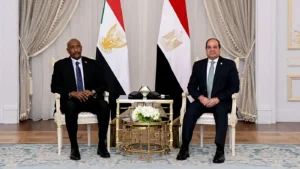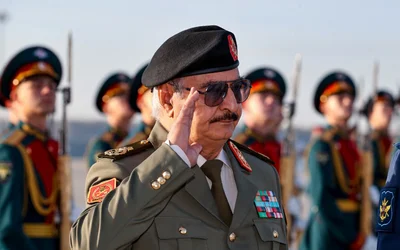Egypt hosts secret talks between Burhan and Haftar in bid to mend ties the meeting ended badly
By Sean Mathews and Oscar Rickett
Egypt hosts secret talks between Sudan’s Burhan and Libya’s Haftar in bid to mend ties, sources say
Egypt hosted direct talks between Sudan’s army chief and de-facto leader Abdel Fattah al-Burhan and Libya’s eastern commander Khalifa Haftar this week, in a bid to mediate between two allies on opposing sides of Sudan’s war, multiple sources told Middle East Eye.
Underscoring the sensitive nature of the talks, the Egyptian government released separate photos of Egyptian President Abdel Fattah el-Sisi meeting first the Libyan delegation and then the Sudanese delegation in what appeared to be the same room in the Mediterranean coastal city of el-Alamein.
Privately, however, Burhan and Haftar, along with their delegations, held face-to-face talks as part of an effort by Sisi to manage tricky relations between two important partners.
Egypt backs both Burhan, who is fighting a brutal war against the paramilitary Rapid Support Forces (RSF), and Haftar, the commander who controls eastern Libya.
According to a Sudanese intelligence source, the meeting between the two leaders did not go well. Extremely worried by the prospect of Sudan’s war spilling over into Egypt and by the disruption of trade in the volatile triangle border region that takes in Libya, Sudan and Egypt, Sisi was hoping to broker a peace deal between Burhan and Haftar.
Instead, the Sudanese army chief accused the eastern Libyan commander of smuggling weapons to the RSF, and of working with the United Arab Emirates to assist the paramilitary of General Mohamed Hamdan Dagalo in other ways, the sources said.
Haftar, who had one of his sons with him, denied the accusations. Burhan told him that he was not being honest, and that the Sudanese had proof of his involvement.
The Sudanese delegation mentioned that Sadeeq Haftar, Khalifa’s son, had been in Sudan before the war began in April 2023, and had met with Dagalo, the RSF chief better known as Hemeti.
Days after the war began on 15 April, MEE reported that Sadeeq had flown to Khartoum on a private jet and donated $2m to a football club connected to Hemeti, before breaking his fast with the RSF leader at his home in the Sudanese capital.
According to the Sudanese intelligence source, the meeting between Burhan and Haftar ended badly, with Sisi also not happy about the conversation.

Border trouble
Sudan, Libya and Egypt’s borders all meet in the vast, lawless, triangle desert region.
When fighting between Burhan’s army and the RSF first erupted in 2023, Haftar sent military supplies by truck and planes to the RSF. Those supplies tapered off as the RSF turned to a more convenient route through neighbouring Chad. More recently, forces in southern Libya loyal to Haftar joined the RSF in attacking border posts controlled by the Sudanese army. The RSF’s seizure of the border triangle alarmed Cairo.
Now, the Sudanese intelligence source said, the RSF had taken over Maaten al-Sarra airbase in the Kufra district of southern Libya. This base is integral to the supply of weapons to the paramilitary in Sudan and to the export of gold out of the country from the mines of Darfur, which are owned and controlled by the Dagalo family.
Egyptian officials have blamed Haftar’s youngest son, Saddam, for the raid in the triangle region. Saddam serves as chief of staff in his father’s army and controls militias, including Islamists, in southern Libya. He is increasingly seen as the successor to his 81-year-old father and has been courting support in Washington and Ankara.
An Egyptian analyst, who requested anonymity to discuss a sensitive subject, told MEE that “the problem is the relationship between Saddam Haftar and the RSF. Khalifa is losing power as he gets older, and this power is now divided up among his three sons.”
“Egypt has a hold on the relationship with Sadeeq Haftar internally and inside Libya,” the source said, “but not the other two sons, Saddam and Khaled, who run the Islamist groups that work with the RSF on the border.”
According to the sources, both Saddam and Khaled Haftar attended the meeting with Sisi. Egypt’s director of general intelligence service, Major-General Hassan Rashad, was also at the talks.
Egypt, Libya, Sudan
Egypt has played an outsized role in Libya since the Nato-led ousting of longtime ruler Muammar Gaddafi in 2011. The country descended into civil war, which became a proxy conflict with Russia, the UAE, Egypt and France backing Haftar and Turkey supporting a rival government in western Libya.
Like in Libya, Sudan’s ruler Omar al-Bashir was overthrown in 2019, having taken power in 1989. Four years later, fighting broke out between Burhan’s army and the RSF, a paramilitary once loyal to Bashir and allied to the army.
Egypt supports Burhan and his army, though this support is, for the most part, just logistical. At the onset of the conflict, Egyptian pilots flew planes supporting Sudanese army operations against the RSF.
The longstanding relations between Egypt and Sudan’s armies and its support for Burhan in Sudan’s ongoing war have been a problem for relations between Cairo and its powerful Gulf ally, the UAE, which is the RSF’s main patron.
External monitors have documented military shipments emanating from the UAE to the RSF. Yale’s Humanitarian Research Lab recently reported that Chinese-made drones “consistent with FH-95s” bought by the UAE had been flown into RSF-controlled Darfur.
In May, Amnesty International found that the UAE, which continues to deny supporting the RSF, was sending Chinese-made weaponry, including GB50A guided bombs and 155mm AH-4 howitzers, into Darfur despite an ongoing UN arms embargo.
Gold continues to flow out of the Dagalo family’s lucrative gold mines in Darfur, with Hemeti stashing much of his wealth in Dubai.
Some of the gold also finds its way to Russia, which is continuing to play both sides in Sudan’s war – the Russian government offers support to Burhan’s army while the Africa Corps, the successor to the Wagner Group, continues its partnership with the RSF.
Sudan and Libya underscore the convoluted web of alliances and counter-alliances that have come to define the region since leaders like Gaddafi and later Bashir were removed from power.
The old ideological fault-lines that emerged in the post-2011 Arab Spring era have become murkier. Egypt and the UAE both supported Haftar in 2019 in his bid to conquer Tripoli, the seat of Libya’s internationally recognised government. At the time, the RSF sent fighters to bolster Haftar’s ranks.
Haftar still enjoys support from the UAE, but Saddam Haftar has been courting Qatar and Turkey more recently – two of the UAE’s traditional foes.
Likewise, cash-strapped Egypt has received billions of dollars in investments from the UAE and continues to back Haftar, but is opposed to the RSF.
Middle East Eye delivers independent and unrivalled coverage and analysis of the Middle East, North Africa and beyond. To learn more about republishing this content and the associated fees, please fill out this form. More about MEE can be found


